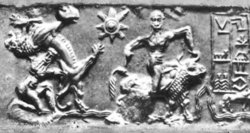
Gilgamesh: Reaching for the Secret of Eternal Life
By Robert M. Giannetti

The profound and consuming mystery of death preoccupies the epic
hero, Gilgamesh, as he laments the loss of his friend, Enkidu, in the ancient
poem, Gilgamesh, composed c. 2000 B.C. in what is now modern-day Iraq. Unable
to deal with his grief for his friend and with his fear of his own mortality,
Gilgamesh strikes out on a mythic journey in search of the secret of eternal
life. It is a journey pursued with great effort under extreme psychological
distress. The goal is not the attainment of eternal life in the hereafter, but
the extension of life here and now. Remarkably, Gilgamesh is privileged to be
able to grasp the secret. But in the end he is unable to keep it from being
taken away.
There is considerable poignancy in Gilgamesh's journey, as there
are no palliatives to the anxieties of mortality in the world he inhabits. We
are a very long way from the religious comforts of the Christian afterlife of
Dante and Milton, in which the good are rewarded and the evil punished, or the
civic assurances of Virgil's afterlife, in which departed souls are cleansed of
their imperfections and recycled into the growing populace of an expanding
Roman Empire. Homer's epics, nearer but hardly very close in time, are also
somewhat different in spirit. But in the Underworld of the Odyssey we find
clear resonance with Gilgamesh's primal, gut response to the reality of death.
Achilles, in death a mere shade, tells Odysseus that he would rather be a
common laborer alive on the earth than a renowned hero in the dismal and
meaningless afterlife. Consider Gilgamesh's comrade in arms, Enkidu, relating
his frightening dream of what he saw awaiting him in death:
Some fierce
and threatening creature flew down at me
and pushed me with its talons toward
the horror-filled house of death ...
The lot of mortal man is simply doom. Gilgamesh's quest is founded
on a raw and desperate desire to keep on living and to not have to face the
unmitigated horror of death.
The quest begins with Gilgamesh's resolve to seek an audience with Utnapishtim,
the god who holds the secret of eternal life. It is indeed a rigorous and
perilous journey he embarks upon. Gilgamesh negotiates his way past poison
scorpions and proceeds up a great mountain in cold and darkness. None too soon,
he is relieved to come upon Siduri, the girl who gives lifesaving drinks to
travelers. Gilgamesh tells her of his grief and asks her for directions to
Utnapishtim. Siduri makes a point of first telling him to cherish the simple
pleasures of the life he already has, but eventually directs him to Urshanabi,
a ferryman figure who can help him reach his goal. Upon meeting Urshanabi,
Gilgamesh again unloads the burden of his grief, telling the ferryman:
Mortality reached him first [Enkidu] and I am left this week
to weep and wail for his shriveling corpse which scares me.
***
Won't I soon be like him, stone cold and dead, for all days to come?
Like Siduri, Urshanabi tries to direct Gilgamish inward, to more closely examine
his own attitudes and emotions in the present, to realize the stress he has put
himself under and what it has done to him. But in the end he also agrees to
help him reach Utnapishtim, to see if the secret of eternal life can be
obtained. They build a raft and sail out on Death's own sea, finally
encountering Utnapishtim, who says:
Why cry over your fate and nature?
Chance fathered you ...
I do not presume to know how to help the likes of you.
***
Behold the cold, cold corpse from a distance,
and then regard the body of one who sleeps.
There seems no difference. How can we say
which is good and which is bad?
And it is also like that with other things as well.
The ways of fate are "veiled from human beings", he goes on to say. The gods,
prior to Judeo-Christian monotheism, do not have all the answers and cannot
tell you authoritatively what to do, or at least are not willing to do so. As
Joseph Campbell pointed out many times, the gods are not the source of the
physical and spiritual forces. They are rather the personified expression of
those forces themselves.
So what is Gilgamesh to do? In rapt wonder in the presence of the god, he
momentarily gives his grieving mind a rest, and asks Utnapishtim how he,
himself, attained his stature as the keeper of the secret of eternal life.
Gilgamesh's own expanding sense of awareness is evident in these words:
When I regard you now, my god-like man,
It's like seeing my own face on calm water
where I dare to study myself.
Utnapishtim explains that he was elevated from his initial mortal condition to
his present god-like status upon fulfilling the directives of the gods to build
a boat for him and his wife to escape a great flood that devastated the earth
(in great detail anticipating the story of Noah by hundreds of years before its
appearance in the Hebrew Bible).
Earlier than that time, Utnapishtim was not divine.
Then with his wife he was deified
and sent to rule the place where rivers start.
As for you, Gilgamesh, which gods will be called on
to direct your path and future life?
Arise! Be alert! Stay up with the stars for
seven long and sleepless nights!
But Gilgamesh collapses from apparent exhaustion. Upon awakening, he hears these
words from Utnapishtim, uttered with appreciation and compassion for the great
fortitude displayed in his heroic quest:
Gilgamesh, you labored much to come here.
How can I reward you for traveling back?
May I share a special secret, one
that the gods alone do know?
There is a plant that hides somewhere among the rocks
that thirsts and thrusts itself deep
in the earth, with thistles that sting.
That plant contains eternal life for you.
Gilgamesh searches and dives beneath the cold waters, finds the plant, and
although it stings him, brings it to the surface. His personal gratitude and
generosity of resolve are immediate. He will bring the plant back to his
kingdom of Uruk, where he will give the plant to "aged men as food", and "I too
intend to eat it and to be made forever young." But as nothing gold can stay,
the tale does not end here. There is more to be learned. Setting up camp on the
return trip, Gilgamesh slips into a pool for a cool swim. There, "a cruel snake
slithered by and stole the plant from Gilgamesh who saw the snake grow young
again." (The serpent is just as much a spoiler here as he would be in Genesis
with regard to man's prospects for immortality.)
Gilgamesh falls into despair, feeling that he has lost forever "that special
sign that god had left for me." But he quickly realizes when he again comes in
sight of his native land of Uruk, returning after such a long journey, that he
can look at it with new eyes. Like all mortals, he has forgotten the need to be
renewed in his attentive awareness to things closest to him, no matter how
thwarted he may be in his quest for things of the infinite. As he gazes on
Uruk's wall once again, he observes, with rapturous wonder, what has always
been there for him to see from the very beginning:
... examine
Uruk's wall. Study the base, the brick,
the old design. Is it permanent as can be?
Does it look like wisdom designed it?
There is a certain ineffability in this epiphany at the gates of the city, as
there is in so many other sublime moments throughout this earliest and arguably
greatest epic. Its composition predates Genesis by perhaps a millennium and
taps roots deep in the human psyche. Its wisdom is unadorned by authoritarian
religious formulations that seek to explain away the mystery of death outside
the ken of our common human experience in this life as we know it. We can all
relate immediately and concretely, then as today, to the voyage of personal
discovery that we must all make for ourselves, threading our own way through
the perils and wonders of this life. In the final analysis, as this great work
seems to suggest, the most basic need is to be able to live fully in the
present, enraptured in it if we can. The advice of Urshanabi still holds, as
does that of Siduri, the girl who sits by the sea and gives lifesaving drinks
to travelers. And she perhaps puts it best of all:
Remember always, mighty king,
that the gods decreed the fates of all,
many years ago. They alone are let
to be eternal, while we frail humans die
as you yourself must someday do.
What is best for us to do
is now to sing and dance.
Relish warm food and cool drinks.
Cherish children to whom your love gives life.
Bathe easily in sweet, refreshing waters.
Play joyfully with your chosen wife.
It is the will of the gods for you to smile
on simple pleasure in the leisure time of your short days.
Citations
Wilkie, Brian & James Hurt, eds., Literature of the Western World: the
Ancient World Through the Renaissance, Vol. I, 5th Edition (Upper Saddle River,
NJ: Prentice Hall, 2001):
Gilgamesh (Jackson trans.)
Tablet VII, Column IV, 85-88 (p. 41)
Tablet X, Column III, 145-146, 154 (p.52); Column V, 224-225, 228-229 (pp.
53-54); Column VI, 243-247 (p. 54)
Tablet XI, Column I, 3-5 (p. 55); Column IV, 179-181, 183-186 (pp. 58-59);
Column VI, 255-262, 302-304 (pp. 60-61)
Tablet X, Column III, 87-99 (p.51)
Copyright (c) 2005 by Robert M. Giannetti
Return to Passages Menu
|
